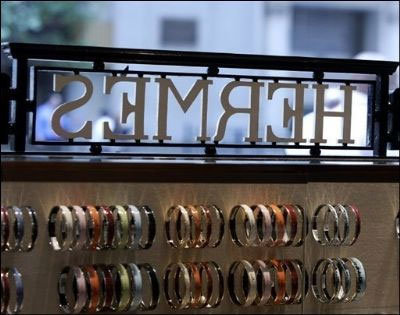Reuters
Jun 6, 2010
European luxury brands see US growth
Reuters
Jun 6, 2010
NEW YORK/PARIS (Reuters) - While ordinary retailers fight for growth in the U.S. market, European high-end designers and store chains still see plenty of room to expand by catering to the most affluent American shoppers.
 Hermes is expanding in the USA - Photo : AFP/Archives/Timothy A. Clary |
Wealthy U.S. shoppers have traditionally spent less on luxury than their foreign counterparts, leaving more upside potential if they are successfully wooed, said Isabelle Ardon, a Paris-based luxury fund manager at SG Gestion.
By Ardon's estimates, Americans typically spend about 0.2 percent of their personal income on luxury items, compared with 0.9 percent in France and 1 percent in Japan.
That, coupled with immigrants' desire to display their success in climbing the social ladder, means the U.S. market still provides enormous opportunity for growth, Ardon told the Reuters Global Luxury Summit this week.
Saks Inc (SKS.N) Chief Executive Stephen Sadove, whose upscale chain operates stores exclusively in the United States, said a tentative economic recovery will also help luxury sales.
"You do have customers, some of the aspirational customers, who are coming back. As people feel more comfortable with employment, with their own individual situation, you will get growth," Sadove said.
A number of the most renowned European luxury brands agree, and are looking to tap into the U.S. market's prospects as they seek relief from their home continent's economic crisis.
"In the U.S., every month is a record (sales) month" for Swiss watchmaker Hublot, said Jean-Claude Biver, chief executive of the company, which is part of luxury group LVMH (LVMH.PA) and is still a minor player in the United States.
Biver expressed worries that Europe's current debt crisis would crimp his company's sales there.
HERMES, LONGCHAMP GO USA
Other exclusive European names betting on the United States include Hermes (HRMS.PA) and privately held leather goods maker Longchamp, which said U.S. sales are at record levels. Both plan to open more U.S. stores.
The United States accounts for only 4 percent of Hermes' global sales, but the French company opened a men's store on Manhattan's tony Madison Avenue earlier this year, and is planning to gradually expand beyond its 24-store U.S. footprint.
Oscar de la Renta CEO Alex Bolen disputed the idea of the United States as an "emerging market," but said the New York-based fashion house had yet to fully realize its potential there.
"We can achieve very nice healthy growth rates by selling more at the places (where) we are selling goods today," Bolen said, noting opportunities in handbags and shoes.
Yet for all its potential, the U.S. market has built-in limits that preclude it from ever becoming as important as Europe, or perhaps even the fast-growing Chinese market.
SG Gestion's Ardon said Americans frown upon showing off and that chic goodies were lower on their priority list.
Italian fashion house Cerruti's chief executive, Florent Perrichon, warned that luxury is less a part of the American DNA, and that U.S. shoppers at large were less easily impressed by high-end European wares, making it a tough market.
"Luxury is not spontaneous in the U.S.; you need a strong communication to penetrate the American market," Perrichon said in an interview in Paris. "European luxury is less appealing to American consumers than it is to Asian consumers."
Many top luxury brands are also actively pursuing the Chinese market.
Still, unlike most Western countries, the U.S. population is still growing and is ambitious, pointing to a robust market long term, once consumers get fully through the current credit crisis and economic storm.
"We are so achievement-oriented still -- one of the rewards of achievement is luxury, we want the best," said Milton Pedraza, chief executive of the Luxury Institute, a New York-based consulting firm.
(For more on the Reuters Global Luxury Summit, see)
(Additional reporting by Astrid Wendlandt, Silke Koltrowitz, and Eva Kuehnen in Paris; Editing by Richard Chang)
© Thomson Reuters 2024 All rights reserved.
























